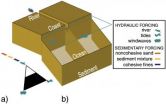(Press-News.org) BOSTON, Mass. (Jan. 26, 2011)—As news outlets throughout Europe and the U.S. report on the plummeting health of Western adults and children, there is no shortage of culprits. One villain often bandied about is the "fee for service" system of incentives for physicians. Clearly, if doctors are financially rewarded for simply performing more procedures, costs will soar at the expense of patient health.
Enter Pay-for-Performance, an emerging movement in which physicians are rewarded not for what they do, but for quality of care and patient outcomes. Under such a system, economic logic dictates that patients should theoretically show marked improvements when doctors' incentives shift from procedure to patient.
This new approach was implemented in the United Kingdom in 2004 in a program termed "Quality and Outcomes Framework." But whether or not such an approach has actually improved patient health remains an open question.
A new study published January 26 in BMJ presents the strongest evidence yet that Pay-for-Performance does not offer any benefit to patients with hypertension, despite the enormous administrative costs required to maintain such a system.
"No matter how we looked at the numbers, the evidence was unmistakable; by no measure did pay-for-performance benefit patients with hypertension," says lead author Brian Serumaga, formerly of Harvard Medical School/Harvard Pilgrim Health Care Institute, but now at University of Nottingham Medical School.
Working closely with researchers at Harvard, Nottingham, and the University of Alberta in Canada, Serumaga and his colleagues focused on how Pay-for-Performance might affect outcomes in patients with hypertension, a condition where other interventions such as patient education have shown to be very effective.
Analyzing data from the UK's Health Improvement Network, a large database of primary care records from 358 UK general practices, the international research team identified
470,725 patients diagnosed with hypertension between January 2000 and August 2007, spanning four years prior, and three years after, Pay-for-Performance was implemented.
The researchers looked at various measures including blood pressures over time, rates of blood pressure monitoring, and hypertension outcomes as well as illnesses.
Analysis showed that even after allowing for a number of variations, there was no identifiable impact on the cumulative incidence of stroke, heart attacks, renal failure, heart failure or mortality in both patients who had started treatment before 2001 and patients whose treatment had started close to the implementation of Pay-for-Performance.
"Governments and private insurers throughout the world are likely wasting many billions on policies that assume that all you have to do is pay doctors to improve quality of medical care," says senior author Stephen Soumerai, professor in the Department of Population Medicine at Harvard Medical School and Harvard Pilgrim Health Care Institute. "Based on our study of almost 500,000 patients over seven years, that assumption is questionable at best."
According to Anthony Avery, also of University of Nottingham Medical School, "Doctor performance is based on many factors besides money that were not addressed in this program: patient behavior, continuing MD training, shared responsibility and teamwork with pharmacists, nurses and other health professionals. These are factors that reach far beyond simple monetary incentives."
"Policymakers sometimes legislate large and expensive policies based on their beliefs without the requisite hard evidence," says Soumerai. "Policy makers in the U.S. and in Canada who are attempting to enact such programs need to think hard about other more effective approaches."
INFORMATION:
This study was funded by the Harvard Medical School Fellowship in Pharmaceutical Policy Research, U.S. Agency for Healthcare Research and Quality HMO Research Network Centre for Education and Research in Therapeutics, and the Alberta Heritage Foundation. The paper states that all authors have no financial relationships with any organization that might have an interest in the submitted work in the previous three years.
Written by David Cameron
Full Citation:
BMJ (British Medical Journal), Wednesday, January 26, online publication
"Has Pay-For-Performance improved the management and outcomes of hypertension in the United Kingdom? An interrupted time-series study"
Brian Serumaga(1,2), Dennis Ross-Degnan(1), Anthony J Avery(2), Rachel A Elliott(3), Sumit R Majumdar(4), Fang Zhang(1), Stephen B Soumerai(1)
1-Department of Population Medicine, Harvard Medical School and Harvard Pilgrim Health Care Institute, USA.
2-Division of Primary Care, University of Nottingham Medical School, United Kingdom.
3-Division of Social Research in Medicines and Health, University of Nottingham School of Pharmacy, United Kingdom.
4-Department of Medicine, University of Alberta, Canada.
END
BEER-SHEVA, ISRAEL, January 25, 2011 – Sustained exposure to loud workplace noise may affect quality of sleep in workers with occupational-related hearing loss, according to a new study by Ben-Gurion University of the Negev researchers.
Published in the journal Sleep, the study compared the sleep quality of individuals at the same workplace, some with workplace noise-related hearing loss and some without.
Workers with hearing loss had a higher average age and longer duration of exposure than those without hearing impairments. Also, 51 percent of those with hearing ...
If the U.S. military increases its use of alternative fuels, there will be no direct benefit to the nation's armed forces, according to a new RAND Corporation study.
Any benefits from investment in alternative fuels by the U.S. Department of Defense will accrue to the nation as a whole rather than to mission-specific needs of the military, researchers found. The study is based on an examination of alternative jet and naval fuels that can be produced from coal or various renewable resources, including seed oils, waste oils and algae.
In response to a congressional ...
Last summer's disastrous Pakistan floods that killed more than 2,000 people and left more than 20 million injured or homeless were caused by a rogue weather system that wandered hundreds of miles farther west than is normal for such systems, new research shows.
Storm systems that bring widespread, long-lasting rain over eastern India and Bangladesh form over the Bay of Bengal, at the east edge of India, said Robert Houze, a University of Washington atmospheric sciences professor. But Pakistan, on the Arabian Sea west of India, is substantially more arid and its storms ...
Researchers from the University of Gothenburg and Sahlgrenska University Hospital are the first in the world to show that an operation can help patients with dementia caused by white matter changes and hydrocephalus.
Presented in the American Journal of Neurosurgery, the results are based on the world's first study to demonstrate the effects of a shunt operation using a placebo control. 14 patients were followed for an average of three and a half years after the operation, with half being given a non-functioning shunt – in other words a sham operation – and the other ...
T.rex hunted like a lion, rather than regularly scavenging like a hyena, reveals new research published in the journal Proceedings of the Royal Society B.
The findings end a long-running debate about the hunting behaviour of this awesome predator.
Scientists from the Zoological Society of London (ZSL) used an ecological model based on predator relationships in the Serengeti to determine whether scavenging would have been an effective feeding strategy for T.rex.
Previous attempts to answer the question about T.rex's hunting behaviour have focused on its morphology. ...
The previously unknown species of ribbon worm discovered in Kosterhavet National Park in 2007 has now been scientifically named using a new method. Pseudomicrura afzelii, a form of nemertean or ribbon worm, has been described and registered by researchers at the University of Gothenburg, Sweden, using DNA technology.
"We've shown that it's possible to move away from the traditional, highly labour-intensive way of describing a new species. Developments in molecular biology have made it possible to determine the genetic code for selected parts of DNA both quickly and cheaply." ...
By adding information about the subsoil to an existing sedimentation and erosion model, researchers at Delft University of Technology (TU Delft, The Netherlands) have obtained a clearer picture of how rivers and deltas develop over time. A better understanding of the interaction between the subsoil and flow processes in a river-delta system can play a key role in civil engineering (delta management), but also in geology (especially in the work of reservoir geologists). Nathanaël Geleynse et al. recently published in the journals Geophysical Research Letters and Earth and ...
Scientists studied the defences used by caterpillars that transform into large white butterflies, called Pieris brassicae. The insects regurgitate semi-digested cabbage leaves to make them smell and taste unpleasant to predators. The team found, however, that frequent use of this defence reduces the caterpillars' growth rate and the number of eggs they produce. It remains unclear why their defences affect them in this way, but the loss of nutrition from frequent regurgitation is thought to play a part.
Caterpillars are a target of pest control, as they destroy food ...
The successful Swedish model of reducing the impact of students' different social, cultural and economic backgrounds on academic outcome is severely threatened after 20 years of educational reforms. This is the main point made by Docent (Reader) Girma Berhanu from the University of Gothenburg in International Journal of Special Education.
Some of the previously very positive trends in the Swedish school system seem to have been put in reverse over the past 20 years, and students with special needs, immigrant students and socially disadvantaged students are getting the ...
"Seeing as psychopathic behavior is similar to that of a person with brain damage, it could be that it could benefit from similar forms of treatment," said Dr. Simone Shamay-Tsoory, who conducted the study.
People diagnosed as psychopathic have difficulty showing empathy, just like patients who have suffered frontal head injury. This has been shown in a new study from the University of Haifa. "Our findings show that people who have psychopathic symptoms behave as though they are suffering frontal brain damage," said Dr. Simone Shamay-Tsoory, who conducted the study.
Psychopathy ...



